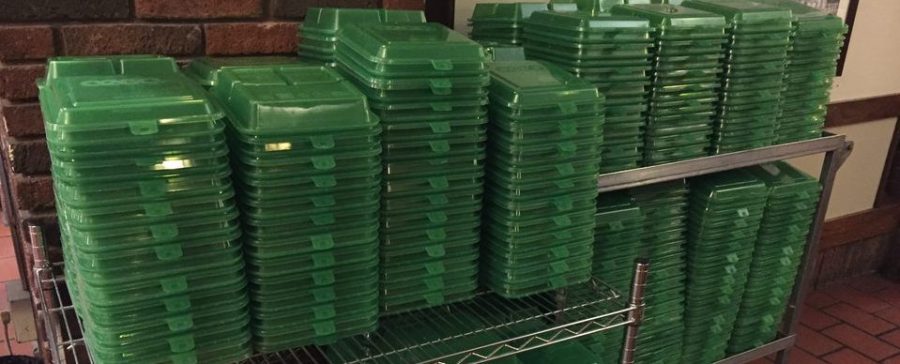For the past couple of decades, Carleton has worked to promote environmentally responsible practices throughout campus. However, in the face of the COVID-19 pandemic, the administration chose to prioritize health and safety over sustainability by introducing more disposable and single-use products.
According to Alexandra Miller, Carleton’s sustainability program coordinator, in many cases, this increased waste is unavoidable when considering community safety.
“Right now, it’s my opinion that we are all in emergency mode and have had to pivot significantly in the way we work to adapt to the new normal we are in. It will take some time to make tweaks and readjust as new information comes out about the virus. I also think that winter break will give us all a very needed break to reassess and start anew for Winter Term,” she said, adding that she is open to suggestions about improving sustainability.
The main increase in waste since the start of the pandemic has been due to higher usage of compostable to-go clamshells for food distribution. Last spring, with 300 students on campus, dining halls were going through 12,000 clamshells per week, according to Bon Appetit. With the introduction of Green2Go, this number decreased to nearly zero.
The Green2Go initiative, spearheaded last year by the Sustainability Office and Sustainability Assistant Andrew Farias ’21, has played an integral role in pandemic safety measures. Green2Go containers are available at all dining locations to give students the option to take their food out of the dining hall, decreasing the density of students eating inside. The containers are reusable and can be used up to 300 times, lowering dependency on disposable clamshells.
While the Green2Go initiative was not directly inspired by the pandemic, the program’s timing was seemingly perfect as it provided more environmentally friendly options in a time when single-use containers would have been overused. The program will continue to help the campus decrease waste far into the future, though single-use containers are still used in quarantine and isolation houses to decrease risks of transmission.
While the Green2Go program is a significant change to dining hall routines, much of the food production and food waste minimization efforts in the dining halls is the same as it has been in previous years. Bon Appetit Sustainability Ambassador Ella Hein ’23 said, “Luckily the pandemic has not had a negative impact on food waste behind the line. We are still able to order food in bulk, cook meals in small batches and utilize stem-to-tail cooking, all in an effort to minimize waste as we always have.”
As far as waste from increased building sanitation, Custodial Manager Patti Sabrowski said that “disinfectant wipes deployed around campus are really the one additional waste item. Otherwise all the other supplies are the same things that [the] department has always used. Additional disinfecting is not generating a notable amount of additional waste.”
With fewer students on campus due to this term’s remote option, Martha Larson, manager of Campus Energy and Sustainability, reported that the college is producing less waste on the whole. “We went from daily waste pick-ups at most waste sites to on-call pickups on an as-needed basis. We expect to see reductions in our fiscal year 2020 reporting data, which is coming out soon,” said Larson.
Looking into the future, Miller explained that she has two main projects planned. She hopes to streamline waste data collection in order to “quickly respond to changes in the waste stream, something we are only guessing at now without any sort of dashboard,” along with making waste collection more efficient by “exploring ways in which we can move or combine waste sites as well as how we can reduce waste altogether.”
Miller also noted that the 2011 Climate Action Plan will undergo a review in either Winter or Spring Term by the Environmental Advisory Committee and take into account the challenges COVID presents to sustainability efforts.
Reflecting on the pandemic’s effect on sustainability, Miller said, “I can’t be critical of the changes that have been made. While I always hope we can do what is most sustainable all the time, there are other items to consider. Cost, time to implement, supply chain, staffing and labor, planning effort, safety, are all things that were part of this maze being navigated by the college’s core teams. We can’t be critical of each other in this time of emergency, but rather show grace and humility.”
The Carleton administration, along with the Sustainability Office and Bon Appetit, continue to navigate the challenges of running a college during a pandemic and hope to work collaboratively to find a balance between safety and sustainability.












